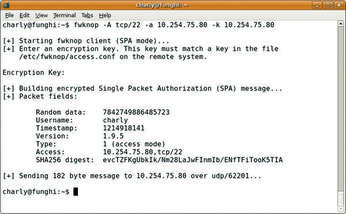KEY EXPERIENCE
The sys admin's daily grind: Single-packet authentication
ByConventional, woodpecker-style port knocking is open to sniffing and brute force knocking attacks. Sending an encrypted packet with an access request to the server is safer and more modern. Learn more about Firewall Knock Operator, a.k.a. Fwknop.
Conventional port knocking, which I described last month, protects you against attackers who routinely scan whole networks looking for "low-hanging fruit." A cracker who takes more time and logs communications can also identify knocking signals because the sequences will repeat.
In theory, you might consider using lists of one-off knocking signals that become obsolete after use. Unfortunately, this is really complex. Besides, if the administrator is not creative enough, an attacker could just try out popular knocking sequences (port 7000, 8000, 9000, ?) to gain access.
 Figure 1: The client knocking on the door of port 22 is allowed to pass because it possesses the right key.
Figure 1: The client knocking on the door of port 22 is allowed to pass because it possesses the right key.
Single-Packet Authentication (SPA) is one possible solution. The knocking system sends a single packet containing the encrypted authentication credentials – typically a pass phrase – and the client request to open a specific port. An SPA implementation that works really well is Firewall Knock Operator, or Fwknop [2]. Besides the normal build tools, the installation requires Perl, the libpcap-dev package, and the CPAN Net::Pcap module. After installing all of these resources, installing Fwknop is a breeze thanks to the Perl-based installer.
Matching Knobs
Fwknop comprises the fwknopd server and the fwknop client. By editing two files below /etc/fwknop/, you can configure the server; fwknop.conf contains the basic configuration. Initially, you will just need to change a couple of parameters, which are tagged __CHANGEME__.
The other knobs you could tweak here have very sensible defaults. Note that you need to synchronize the time between the server and the client because if the difference is too big, fwknopd will ignore the knocking client.
The entries in /etc/fwknop/access.conf define how fwknopd responds to a client knocking. The secret key that the client uses to identify itself is stored here. The SOURCE line can be used to restrict the networks from which the daemon accepts knocking. To set the port that the system opens on successful knocking – for example, tcp/22 for SSH – you can use OPEN_PORTS. Figure 1 shows a successful attempt. The fwknop client picks up the key from its own /etc/fwknop/access.conf.
If the SSH connection doesn't open quickly enough, the FW_ACCESS_TIMEOUT on the server triggers. This time is normally set to 30 seconds, but I went for twice that – never rush an admin on the job!
INFO
[1] "Knock-Knock" by Charly Kühnast, Linux Magazine, September 2008,
[2] Fwknop: http://www.cipherdyne.org/fwknop
Charly Kühnast is a Unix operating system administrator at the Data Center in Moers, Germany. His tasks include firewall and DMZ security and availability. He divides his leisure time into hot, wet, and eastern sectors, where he enjoys cooking, fresh water aquariums, and learning Japanese, respectively.
Subscribe to our Linux Newsletters
Find Linux and Open Source Jobs
Subscribe to our ADMIN Newsletters
Support Our Work
Linux Magazine content is made possible with support from readers like you. Please consider contributing when you’ve found an article to be beneficial.

News
-
Parrot OS Switches to KDE Plasma Desktop
Yet another distro is making the move to the KDE Plasma desktop.
-
TUXEDO Announces Gemini 17
TUXEDO Computers has released the fourth generation of its Gemini laptop with plenty of updates.
-
Two New Distros Adopt Enlightenment
MX Moksha and AV Linux 25 join ranks with Bodhi Linux and embrace the Enlightenment desktop.
-
Solus Linux 4.8 Removes Python 2
Solus Linux 4.8 has been released with the latest Linux kernel, updated desktops, and a key removal.
-
Zorin OS 18 Hits over a Million Downloads
If you doubt Linux isn't gaining popularity, you only have to look at Zorin OS's download numbers.
-
TUXEDO Computers Scraps Snapdragon X1E-Based Laptop
Due to issues with a Snapdragon CPU, TUXEDO Computers has cancelled its plans to release a laptop based on this elite hardware.
-
Debian Unleashes Debian Libre Live
Debian Libre Live keeps your machine free of proprietary software.
-
Valve Announces Pending Release of Steam Machine
Shout it to the heavens: Steam Machine, powered by Linux, is set to arrive in 2026.
-
Happy Birthday, ADMIN Magazine!
ADMIN is celebrating its 15th anniversary with issue #90.
-
Another Linux Malware Discovered
Russian hackers use Hyper-V to hide malware within Linux virtual machines.
